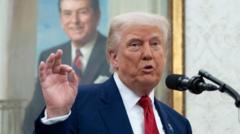The decision by the USPS reflects ongoing tension in US-China trade relations influenced by new tariffs and regulations on imports.
USPS Stops Accepting Parcels from China Amid New Tariffs

USPS Stops Accepting Parcels from China Amid New Tariffs
US Postal Service halts package acceptance from China, citing new trade regulations.
In a significant move impacting cross-border e-commerce, the US Postal Service (USPS) has announced that it will no longer accept parcels from mainland China and Hong Kong until further notice. This suspension, however, does not apply to letters. The USPS did not provide specific reasons for this decision, but it appears to coincide with newly enacted regulations that close a long-criticized loophole regarding low-value imports.
On Tuesday, new trade rules went into effect, terminating the exemption that allowed packages worth $800 or less to enter the US without incurring tariffs or fees. This policy change is part of a broader strategy initiated by former President Donald Trump, who announced an additional 10% duty on all goods imported from China. This move is designed to curb the influx of low-cost items that have been flooding the US market from Chinese e-commerce giants like Shein and Temu, who have effectively utilized this de minimis loophole to gain competitive advantages.
Under President Joe Biden, there were already plans to modify the de minimis tax exemption before Trump announced his latest tariffs. The ramifications of these trade policies are profound, as Trump clarified that all imports from China, including clothing and toys, would now incur tariffs. In a tit-for-tat response, China is also poised to impose tariffs on certain US imports, effective February 10, which will see coal and liquefied natural gas face a 15% levy, among other products.
Nick Stowe, chief executive of Monsoon & Accessorize, expressed support for the changes during a BBC appearance, arguing that these reforms are necessary to level the playing field for US and European retailers who have long felt undermined by Chinese competitors exploiting the tax exemption.
As trade tensions mount, Trump's anticipated communication with Chinese President Xi Jinping has been downplayed, with Trump declaring he is "in no rush" to engage in discussions. Trade experts, including Deborah Elms, noted the significance of this policy shift, especially considering that a substantial volume of imports under the de minimis exemption originates from China. Estimates suggest that nearly half of all parcels coming into the US through this exemption were sourced from Chinese sellers, creating challenges for authorities in monitoring shipments for illegal items.
In light of these developments, the BBC has reached out to USPS for further clarification regarding this decision. Meanwhile, US consumers are left uncertain about potential impacts on their deliveries from China. Stories and experiences from affected individuals within the US on this matter are sought for further insight.





















